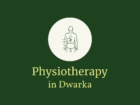Okay, real talk bringing a baby into the world is nothing short of heroic. But once the congratulations fade and the midnight feedings kick in, a big question often goes unanswered: what about you? That’s where post-natal care makes its grand entrance. It’s not just about bouncing back, it’s about reconnecting with your body, healing the right way, and yes, finally addressing all those aches you’ve been brushing off. And if you think physiotherapy is only for athletes, oh boy, are you in for a surprise.

Postnatal Physiotherapy: The Support Every New Mom Deserves
Let’s get real giving birth is nothing short of heroic. But while everyone showers the baby with love and attention, the mother often gets left behind in the recovery process. Sleepless nights, body aches, emotional ups and downs… sound familiar?
Here’s the truth: you deserve support, too. That’s where postnatal physiotherapy comes in.
It’s not about “bouncing back” or rushing to fit into your old jeans. It’s about healing properly, reconnecting with your body, and addressing pain or discomfort before it becomes a bigger issue.
Post-Natal Care: How Can Physiotherapy Help You Heal?
Here’s the scoop: post-natal care is the missing puzzle piece for so many new moms. Sure, you’ve got a brand-new human to take care of, but you’ve also got a healing body that’s gone through the wringer. Between hormone shifts, sleep deprivation, and physical strain, it’s no wonder things feel…off.
That’s where physiotherapy steps in. It’s not just massages and stretches (though those are great too) it’s targeted support designed to help you:
- Strengthen weakened muscles
- Correct postural imbalances
- Manage pain from childbirth and recovery
- Rebuild core stability
- Reconnect with your pelvic floor
In short? It’s about feeling like you again without pretending everything’s fine when it clearly isn’t.
Why Should You Consider Post-Natal Care in the First Place?
Because let’s face it society has a habit of focusing on baby checkups while totally ghosting on the mother’s recovery. You’ve just done one of the most intense physical feats imaginable. You need more than a “take it easy” pat on the back.
Physio support after birth can help with:
- Urinary leakage (yep, sneezing shouldn’t be scary)
- Ab separation (diastasis recti)
- Postural pain from nursing or holding baby
- Pelvic heaviness or discomfort
- C-section scar sensitivity
And the best part? It’s all done at your pace, with your specific body and story in mind.
What Does a Postnatal Physio Plan Look Like?
Every recovery is unique—but here’s a general roadmap of what you can expect.
Step 1: Initial Assessment
Your physiotherapist will gently assess your posture, breathing, core engagement, pelvic floor, and any areas of pain. No judgment—just support.
Step 2: Gentle Movement & Recovery Exercises
We’re not talking about intense workouts. Instead, this includes:
Breathwork to reconnect your core and diaphragm
Pelvic floor training using subtle, low-impact movements
Stretching for common tight areas (like the upper back)
Functional exercises to help you move safely in daily “mom life”
Step 3: Ongoing Support & Adjustments
Healing isn’t linear. Some days you’ll feel great, others not so much. Your physiotherapist will guide you through the ups and downs with adjustments and encouragement at every step.
What About Babies? Can Physiotherapy Help Them Too?
Absolutely and that’s where paediatric physiotherapy comes in. Babies may not be walking or talking yet, but they’re growing and developing faster than we can keep up. A paediatric physio can:
- Support your baby’s motor development
- Address issues like torticollis or flat head syndrome
- Help with crawling, walking, or coordination delays
- Educate you on tummy time, posture, and play-based movement
So while you’re focused on recovery, your little one can get a head start on healthy development, too. Win-win.
Common Myths About Physiotherapy After Birth
Let’s bust a few myths while we’re here, shall we?
- “I had a C-section, so I don’t need pelvic rehab.”
Wrong your core and pelvic floor were still affected, and scar tissue can bring its own issues.
- “It’s been months, so it’s too late to start.”
Nope. Whether it’s been six weeks or six years, healing is always worth the time.
- “Pain is just part of motherhood.”
False. Discomfort might be common, but that doesn’t mean it’s normal or something you should just “deal with.”
FAQs
Q: When should I start physiotherapy after birth?
A: Many women begin around 6 weeks postpartum (once cleared by their doctor), but it can start earlier with medical approval especially for pelvic floor support.
Q: Is it safe after a C-section?
A: Yes! In fact, it can help with scar healing, posture, and abdominal recovery when approached gently and professionally.
Q: Will insurance cover this?
A: Many plans do, especially if your doctor provides a referral. It’s worth checking your specific policy.
Q: Is physiotherapy helpful for emotional well-being too?
A: 100%. Feeling stronger physically often helps boost mental resilience. Plus, having a support system that listens and responds to your body’s needs is huge.
Conclusion
Look, being a new mom is a wild ride equal parts magical and messy. And while it’s easy to lose yourself in the blur of feeding schedules, laundry piles, and baby coos, you deserve support, too.
Post-natal care isn’t about snapping back or checking boxes, it’s about honoring what your body’s been through and giving it the tools to thrive. With physiotherapy on your side, recovery doesn’t have to be lonely, confusing, or painful.
You’ve got this, mama. One breath, one stretch, one step at a time.
Oh, and speaking of aches if your back’s been giving you grief lately, especially after all that baby-carrying, don’t underestimate this therapy for spine. It might be exactly what your body’s been begging for.
And for those lingering twinges, especially in your lower back or legs? It could be sciatica creeping in. Another great reason to check in with a qualified physio before it turns into a full-blown issue.

